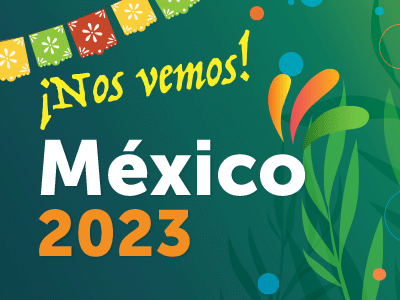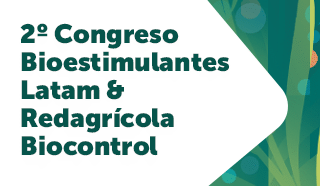10/Mar/2022
#03
SUBSCRIBE TO OUR NEWSLETTER
Suscríbete a nuestro newsletter
Last issue articles
- Biome: the space gaining protagonism in biological strategies for crops
- The export dynamics driving the Mexican biologicals market
- New model developed to evaluate effects of two or more biostimulants combined in a single crop
- Dr. Wagner Bettiol and the biocontrol market in Brazil
- Las propiedades que hacen del Trichoderma un socio clave en la búsqueda de mejores desempeños en los cultivos
- Changes in the new regulation on fertilizers and biostimulants in Chile
- Innovak Global, the expansion of root specialists
Market movers
- Renewable-based nitrogen fertilizer firm raises US$ 20 million in investment round
- Bayer and Ginkgo Bioworks close agreement to strengthen open innovation platform for agricultural biologics
- Argentinean firm Puna Bio: Millions raised to study superbacteria for agricultural use
- Corteva Agriscience signed an agreement to acquire leading biologics company Symborg
- Brazilian study uncovers ants' potential in crop protection
- Huber acquires specialty plant nutrition producer Biolchim
- UPL announces agreement to distribute bioprotector based on orange oil
- ICL and Lavie Bio start strategic collaboration to develop new biostimulants
- Hortitool and Green Smile to organize the Morocco Berry Conference 2022

SAS Expands Its Bio-inputs Catalog With Latin American Flavors
The Spanish firm bets on coffee and bananas to expand its influence in biostimulants to the bioprotection sector. By doing so, it seeks to boost its growth in the Americas, where it makes 50% of its income.
F. Aldunate M.
Their laboratories in Lleida have not stopped working. The Spanish firm is known by the acronym SAS: specialized in biostimulants for the agricultural sector, the company presented five new products in 2021 despite the health crisis due to the COVID pandemic. And for this 2022 it’s preparing to launch “two or three great new projects”.
"Launching products during the pandemic has been a challenge, it has required a different approach," says Carles Zanuy, the global sales manager at SAS, who has seen the complications in accompanying promotional and training efforts regarding new products because of the mobility restrictions. "But the pandemic has also revealed the importance and strength of agriculture, as well as the inputs that seek to increase their quality."

Carles Zanuy, Global Head of Sales at SAS.
The firm is aiming for revenues of around 50 million euros for 2022, if the expectations of a double-digit growth are met this year, the executive explains. He points out that in order for this to happen it is essential to continue innovating and increasing the company’s portfolio, which already has more than 100 products under four different brands: Coda, Forcrop, Plandak and Krystaal.
The solutions that make up each of the products have been the result of the firm's own research and development (R&D). In fact, the manufacturing process is only carried out in the company’s own facilities, located next to its laboratories that are in the process of expansion. "In our model, the laboratory is attached to the factory, just as the nose is attached to the face," explains Zanuy. "As our catalog has grown, our laboratory has also grown, in order to carry out the analyzes of our products ourselves".
Some of the solutions launched during 2021 aim to protect plants from frost, called Kryoss, as well as from solar radiation (Sthenos). Additionally, there is Unibrot, a product that improves the uniformity of sprouting in woody plants, as well as an anti-hydric and temperature stress product called Osmoplant. "They are responses to abiotic stress, the result of an R&D project carried out by SAS regarding this problem" he says.
In addition, they have sought to offer solutions in biocontrol, where they wish to replicate in coffee plants the success achieved with a solution that prevents fungal diseases in bananas, but that does not fall into the category of pesticides or fungicides. In fact, the company, which was founded in 1989 under the name Agrochemical Company, was renamed Sustainable Agro Solutions (SAS) in the early 2000s, precisely because of its desire to differentiate itself from traditional pesticides. “Agrochemicals sounded bad, because we did not and do not make pesticides; the name did not correspond with the philosophy of the company”, he says.
New shareholder
En julio de 2021, SAS completó uno de sus principales hitos históricos, tras ser adquirida por el fondo de inversión británico Stirling Square Capital Partners, por un monto que la prensa española situó en torno a los 200 millones de euros. La firma londinense, que debió pujar para superar los postores de los fondos rivales PAI, Artá e ICG, está especializada en financiar empresas europeas que operan en el ámbito local para llevarlas a escala global, con un sesgo en favor de tecnologías sostenibles. Con esta operación, puso su primer pie en España y en el sector de los insumos agrícolas. “Estamos muy ilusionados con las oportunidades de crecimiento que permitirán a SAS consolidar su posición de liderazgo en el fragmentado mercado de los bioestimulantes, de forma orgánica y a través de M&A internacional”, señaló Enrico Biale, socio de Stirling Square al momento de anunciar la compra.
Until now, SAS has been on the sidelines of the mergers and acquisitions fever that is leading the bio-inputs industry. However, with Sterling entering the company "inorganic growth may be taking on a greater role than it had when the company had a more family origin" says Zanuy. “However, for the previous shareholders it was key that whoever bought shares had to be a company that was aligned with the history of SAS. That is to say, that it did not involve breaking away from its 30-year trajectory, but instead focused on strengthening the model”.
Mission America
The acquisition occurred at a time when SAS products already reached more than 90 countries, with one region standing out above the rest. "America represents 50% of the company's global sales," says Zanuy. “But it is a region with very different realities. There are parts of the continent that are already mature and where we expect moderate growth through innovation and others where we are at an earlier stage and where we expect to grow exponentially”.
Mexico is where the company’s main source of business resides, but one of the areas with the highest expected growth is, in fact, the Southern Cone. "It is an area where we have an incipient relationship, compared to Mexico and Central America, for example," says Pedro Haro, who directs commercial efforts in this subregion made up of Chile, Argentina, Uruguay and Paraguay. "But growth is much greater: we hope to be able to double sales this year in relation to what was sold last year”.

Pedro Haro, Area Manager America.
To do this, the firm adopts differentiated strategies in each country, distributing a combination of brands and products that change according to the market through a network of local distributors, and its own commercial offices in Mexico and Brazil. "In Chile, which is a very small market, despite being very productive, we have decided to bet on the Coda brand, while in Argentina we have diversified, both with Forcrop, Krystaal and Coda," he says.
La fortaleza principal de su catálogo está en el segmento de los bioestimulantes donde está el grueso de sus soluciones, seguido por correctores de suelos. De todos modos, la firma está apuntando a incrementar su presencia en la línea del biocontrol, “pero siempre insistiendo en el concepto de la sostenibilidad”, dice Haro.
In this line, they already have two products that have been tested in the Americas. The first of these is Banadak, a solution that is presented as a biostimulant, but that seeks to prevent diseases in banana plantations and has shown results in the case of sigatoka, the widespread banana disease caused by the fungus Ascomycetes Mycosphaerella fijiensis Morelet.
Now they are repeating the formula with Cafedak, one of the five products they launched in 2021. It is a biological product that prevents coffee rust, a disease caused by the fungus Hemileia vastatrix and whose only host is the coffee tree.
“Hay zonas de América que ya están maduras, y donde esperamos un crecimiento moderado mediante innovaciones, y otras donde estamos en una fase más temprana y donde esperamos crecer de manera exponencial», explica Zanuy.
By the end of 2022, the firm expects to have two to three new solutions ready to launch. "Right now we have two, three large projects in the area of soil improvement, biostimulation and crop activation," says Zanuy. "There are two or three big lines that could bring interesting novelties towards the end of the year, apart from smaller things, more specific to the market."
Last issue articles
- Biome: the space gaining protagonism in biological strategies for crops
- The export dynamics driving the Mexican biologicals market
- New model developed to evaluate effects of two or more biostimulants combined in a single crop
- Dr. Wagner Bettiol and the biocontrol market in Brazil
- Las propiedades que hacen del Trichoderma un socio clave en la búsqueda de mejores desempeños en los cultivos
- Changes in the new regulation on fertilizers and biostimulants in Chile
- nnovak Global, la expansión de los especialistas en la raíz
Market movers
- Argentinean firm Puna Bio: Millions raised to study superbacteria for agricultural use
- Corteva Agriscience signed an agreement to acquire leading biologics company Symborg
- Brazilian study uncovers ants' potential in crop protection
- Huber acquires specialty plant nutrition producer Biolchim
- UPL announces agreement to distribute bioprotector based on orange oil
- ICL and Lavie Bio start strategic collaboration to develop new biostimulants
- Hortitool and Green Smile to organize the Morocco Berry Conference 2022
About us
Biologicals Latam es una revista digital de Redagrícola que informa de manera especializada sobre la intensa actividad que se está desarrollando en el espacio de los bioinsumos para la producción agrícola. Esta publicación es complemento del Curso Online de Bioestimulantes y Biocontrol y las conferencias que este grupo de medios realiza en torno al tema.



